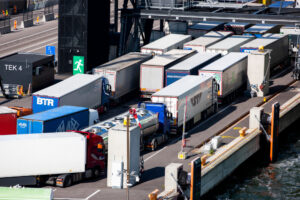Post-Brexit controls on food and farm imports start

Post-Brexit controls on food, plant and animal imports to Britain from the EU have come into force.
Health certificates will now be required on EU goods ranging from cut flowers, to fresh produce including meat, fruit and vegetables.
Some industry bodies raised concerns the rules could cause delays and push up costs, but others said they would help UK farmers be more competitive.
The government said its border model would “minimise burdens for traders”.
The UK left the EU exactly four years ago, but it has taken some time for the government to implement new trade rules – legally required under the Brexit agreement – for goods travelling from the EU to the UK.
The implementation of the changes has been delayed five times, in part to give businesses time to prepare and to reduce disruption to supply chains. The new border checks will also be phased in over the next year, with physical checks starting from 30 April.
The physical checks down the line have prompted fears of disruption to business supply chains. For example, lorries carrying goods could be stopped at ports to ensure they have the correct documentation. Concerns remain that extra checks will see import costs for businesses rise, and in turn prices for consumers.
But from Wednesday, the main change is the introduction of “export health certificates” on imports of “medium risk” animal products, as well as plants and plant products imported to Britain from the EU. The trade rules cover goods ranging from cut flowers, to cheese, fish and meats.
Read full article Share on X